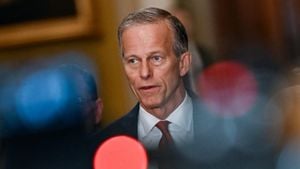A wave of attention has surged around Russian activism and repression, especially following significant recent events revolving around notable activists. Among these figures, Vladimir Kara-Murza, known for his strong opposition to President Putin, captured headlines as he was recently released from Russian imprisonment after being sentenced for spurious treason charges.
Before his arrest, Kara-Murza was actively engaged with European leaders, advocating against the Kremlin's corrupt practices, and promoting accountability through the Magnitsky sanctions. His media presence was prolific; even from behind bars, he managed to send out powerful messages criticizing the Russian regime.
The Kremlin's reaction to dissidence has become increasingly ruthless, particularly with the assassination of opposition figures like Alexei Navalny, who tragically died during his imprisonment. The repressive tactics employed by the Russian government have resulted not only in imprisonment but also the murders of key activists.
Adding to the grim scene of Russian opposition, Gleb Kalinychev recently received a suspended sentence for transferring around $21.50 to Navalny's Anti-Corruption Foundation. This incident underscores the absurdity of the charges against dissenters, with many being detained for acts ranging from political donations to vocal protests.
Kalinychev, sentenced on August 12, pleaded not guilty, reflecting the widespread sentiment among activists who insist their efforts to fight corruption should not constitute criminal activity. The backdrop of such prosecutions reveals the delicate state of political freedom and personal safety for those opposing Putin's regime.
The recent prison exchange between Russia and the West has stirred mixed emotions among former political prisoners and those still engaged with activism. While some celebrate the release of activists like Kara-Murza and Ilya Yashin, others express deep concern over the implication of releasing violent criminals, effectively trading activists for hooded figures of the state.
The exchange, considered by some as disproportionately beneficial to Putin, raises questions about the future of dissent inside Russia. Many fear it may embolden the regime, encouraging perpetrators of violence under the guise of national security.
During press conferences post-release, Kara-Murza and other activists declared their resolve to continue opposing the Kremlin from abroad. Despite appearing to embrace their newfound freedom, many voiced their uncertainty about effectively continuing their work outside Russia's borders.
This dilemma reflects the significant challenge facing Russian dissidents today as they carve out lives and careers far from home. The pressure of exile weighs heavily, with many questioning whether they can maintain their momentum against the oppressive machinery of the Russian state.
Compounding the issues faced by those who have escaped, dissidents have made headlines with contentious remarks about the war in Ukraine. Kara-Murza has argued for recognizing the difference between the Russian state and its people, emphasizing the necessity of distinguishing between victims of Putin's regime and those actively supporting his oppressive policies.
The comments made by former prisoners have ignited debates within the Russian expatriate community over culpability and responsibility for the war. Activists have criticized the released dissidents for their statements, asserting they reflect ignorance or complacency with current conditions under Putin's government.
Internal Russian dissenters note the dangers of vilifying those who are trying to reform the system, warning against fractures within the opposition community. High-profile figures, such as Andrei Pivovarov, have sparked controversy by voicing sympathy for those deceived by military recruitment campaigns.
Pivovarov's stance represents broader tensions among Russian expatriates, many of whom feel disillusioned with the narrative presented by newly freed activists. Resistance against oppressive regimes can take many forms, yet unity and clarity within the opposition appears challenging due to divergent views on how to address the conflict.
The baleful events surrounding the treatment of activists like Kara-Murza and Kalinychev highlight the grim reality for anyone daring to oppose the state. These dissidents have often paid the highest price, yet their voices remain critical for illuminating the human rights atrocities committed under Putin.
Russia's endeavors to silence activists have extended far beyond its borders, involving efforts to disrupt and undermine solidarity among the diaspora. Agencies monitoring activities of exiled Russian dissidents report attempts at sowing discontent within their ranks, with the government frequently leveraging propaganda against dissenting voices.
Reflecting on the broader context, it’s evident the fight against oppression in Russia remains fraught with challenges. The recent release of political prisoners offers both hope and apprehension, as activists grapple with the measures necessary to maintain pressure against the Kremlin.
Strikingly, the tension between emerging discussions of freedom and lingering authoritarianism points to the complexity of Russian political dynamics today. Amidst this confusion, the activists' collective voice remains vibrant, driven by their commitment to reform and accountability.
The fight for justice and liberty, particularly amid such oppressive conditions, defines the essence of the Russian opposition today. With each passing week, their struggle underscores the importance of international support and solidarity to remain resilient before authoritarian repression.
Through their unwavering efforts, these dissidents shine a light on the dark underbelly of Putin’s regime, igniting discussions about freedom, human rights, and the inherent need for civic bravery. Their story is far from over, as both hope and fear intertwine to shape the future of activism against tyranny.



